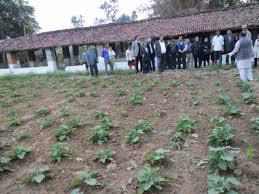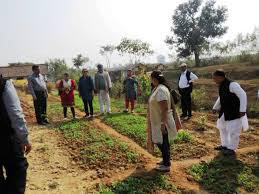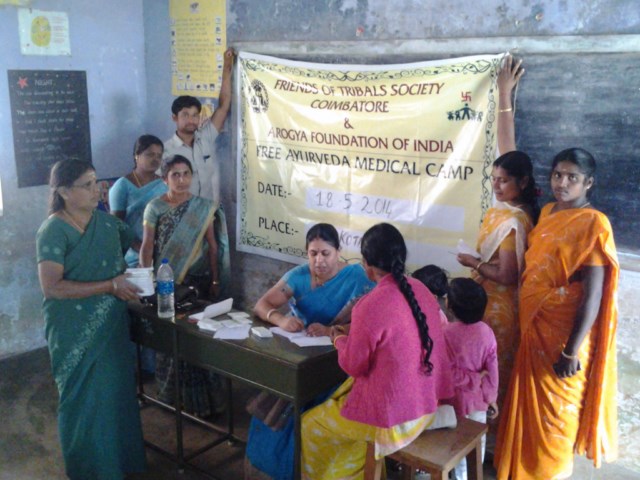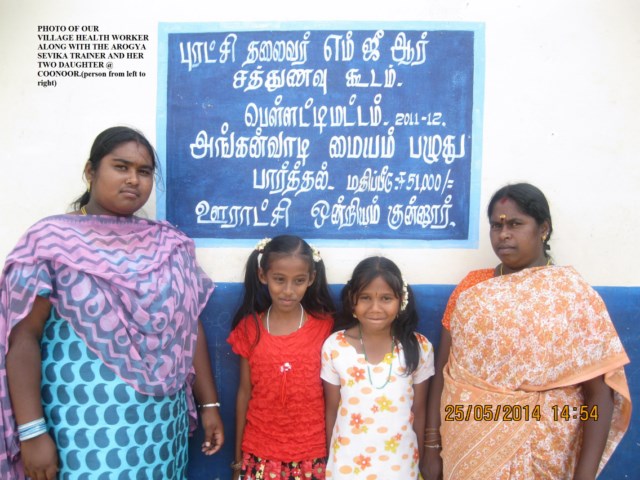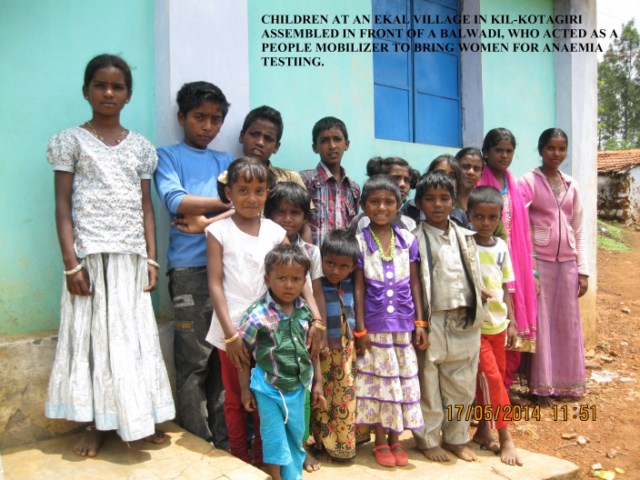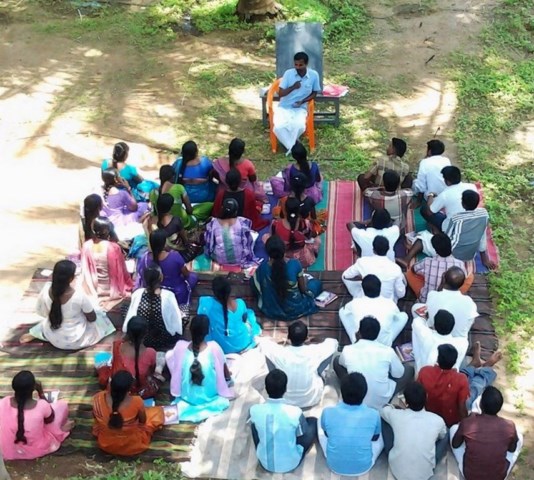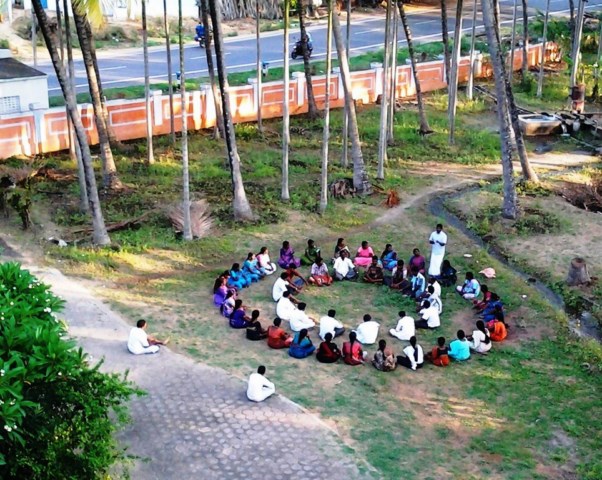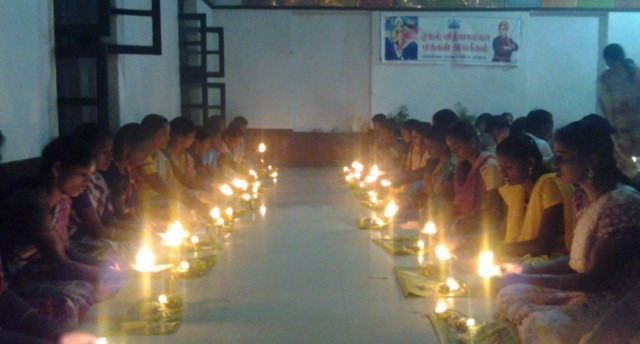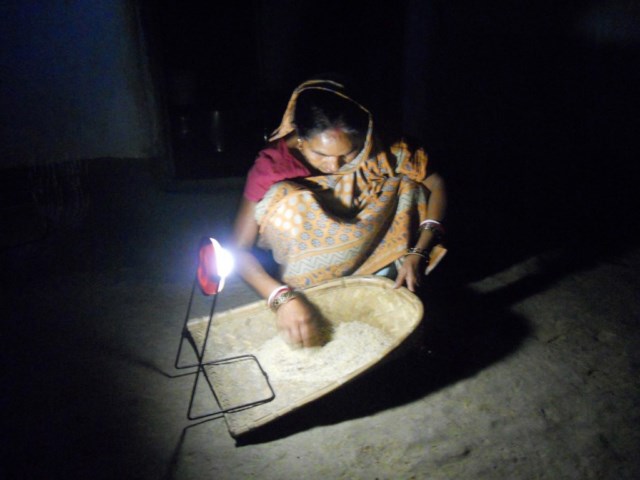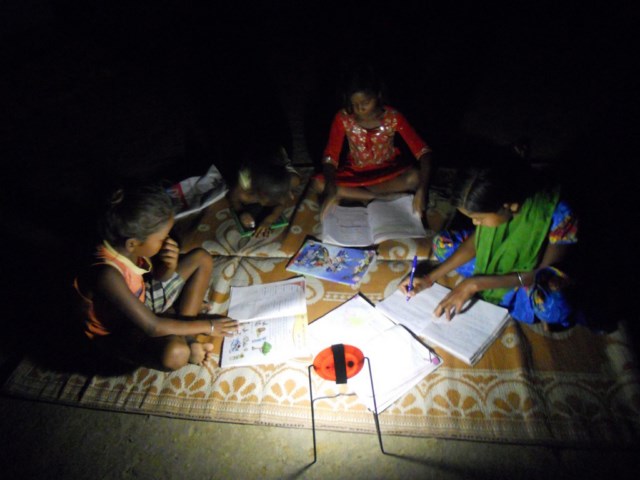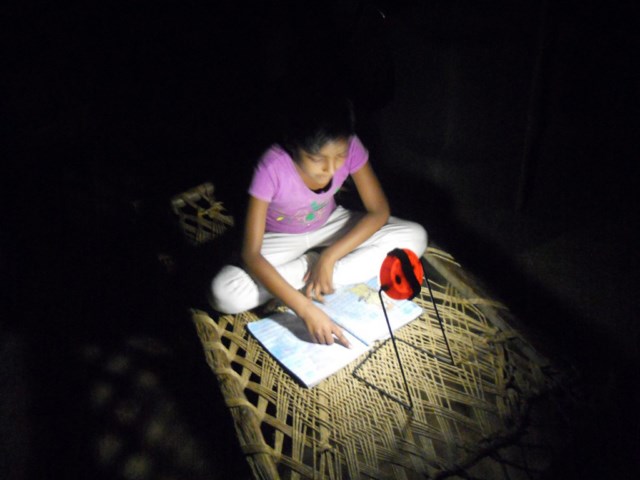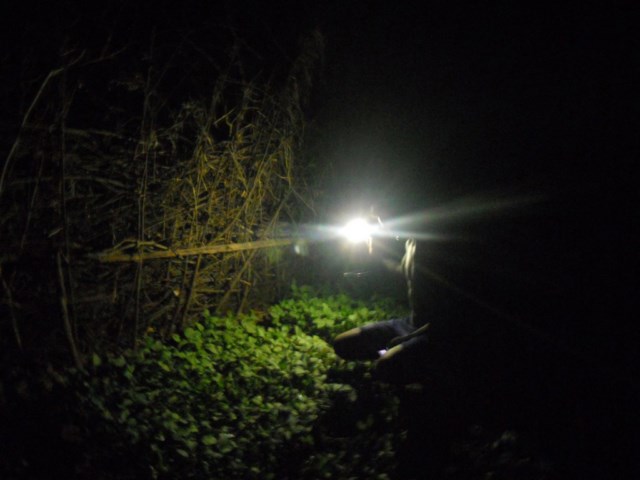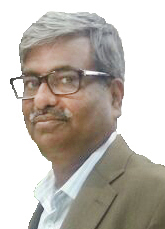TV coverage of Ekal School
TV coverage of Ekal School
In our last month issue we mentioned about CNBC TV 18's coverage of Ekal School. It was broadcasted in their program UNSUNG HEROS. For those who missed it on TV,
click here
Introducing Gramotthan
Taking forward the objectives of Ekal Abhiyan as the socio- economic development of tribals and villagers, Ekal trains the villagers in rural based activities to augment their income under Gramothan Foundation. They are trained to produce fertilizer from cow dung and pesticide from cow urine and certain readily available herbs and in vermin compost. Farmers in the villages generally own cow if they own land. These efforts not only replace the chemical pesticides but also improve the natural fertility of the lands. Another area of focus is conservation of water (Rain water harvesting), to collect rain water in small ponds and to use for cultivation when water will not be available. The Gramothan Resources Centres are providing various facilities as detailed hereunder:
• Development of agriculture on the basis of organic farming based on cow dung and cow urine.
• Training and promotion of small scale vocations suitable for the specific areas
• To develop poshan vatika in the farmer’s land
• To promote vermin compost bed by the farmers
Gramothan Resource Centres (GRC) are in the following states:
• Bhalukbona, Dist. Malda in the state of West Bengal
• Karanjo, Dist. West singhbhum in the state of Jaharkhand
• Jarangloi, Dist. Sundergarh in the state of Orissa
• Kumbakonam Dist. Thanjavur in the state of Tamilnadu
• Wada Dist. Thane in the state of Maharashtra
• Mirzapur in the state of Uttar Pradesh
• Neimisharanya Dist. Lucknow in the state of Uttar Pradesh
• Giridih Dist. Dhanbad in the state of Jharkhand.
Ekal Abhiyan Mahila Vibhag
The annual meeting of Mahila Vibhag Kendriya Samiti on 18 - 19 May 2014 in Nagpur was hosted by Gramotthan Parishad Mahila Samiti, Nagpur.
25 women volunteers, all having state and zonal level responsibilities, participated in the vibrant and interactive sessions during a two-day meeting. The whole discussion revolved around the main challenges of Ekal such as quality, growth of Ekal Vidyalayas, Swavlamban collection through local mobilization, Karyakarta care through Abhibhavak Yojana, involvement of school care families at cluster centres and establishing contact between State – District – Block Level Mahila Samitis.
Mahila Vibhag has focused on six main programs to ascertain spontaneous mobilization of both the Gram Sangathan and Nagar Sangathan. Hence, specific Mahila Vargs are organised throughout the country at state and district centres. The Mahila Samiti volunteers who are free timers are given training in these Vargs, every year since 2001. The first sessions were devoted to reporting about the progress by all the volunteers and reviews. The doubts and queries of the members were resolved with greater conviction in the later session. They ended up turning into “thinking workers” and “working thinkers.”
The main subjects of Mahila Vibhag :
Pravas, visiting Nagar centres and villages; Maa Yashoda Yojana, mass mobilization by keeping Sevapatra in houses, shops and community centres, done by volunteers; Karyakartas Upahar Yojana, taking the Ekal Mission door to door in urban families and collecting gift packets for full time Ekal karyakartas and teachers on the occasion of Sankranti; Vanyatra, organizing visits from cities to Ekal villages. This is a powerful program to cultivate donors and urban karyakartas. Abhibhavak and Sneh Sampark Yojana, identifying and assigning the active women volunteers at state, district and cluster levels to contact and take care of full-timers of the Ekal Parivaar. Mahila Sangathan Vistar and Varg Ayojan, several cultural programs organizing in the cities to propagate the Ekal Mission and strengthen the Nagar Sanagathan.
The Parinam Kumbh of Ekal will commence on 1st March in Dhanbad. The Mahila Vibhag has been assigned to take care of the Sanchalan of the programs and the exhibition. Selected members and volunteers will report two days prior to the event in Dhanbad.
The Mahila Vargs at 15 places have been fixed. The senior mahila adhikari who will attend and guide in each Varg had been decided in the meeting.
Awarness Program on Home Remedies by Arogya foundation of India & FTS, Coimbatore
Second Successful Free Ayurvedic Medical Camp was conducted under the banner of Arogya foundation of India & Friends of Tribal Society-Coimbatore, at Sivanandhapuram in Kil-Kotagiri on 18th May 2014. Dr. Krithiga headed the camp. Dr. Krithiga B.A.M.S is a qualified Ayurvedic physician, and Associate Professor of Ayurveda College, Sulur, Coimbatore and works as a consultant in Shiva Shakti Ayurveda Hospital and in Arya Vaidhya Pharmacy near central bus stand, Coimbatore.
Mrs. Revathymala was handed over the responsibility of organizing the camp with the help of cluster coordinator Mrs. Chitradevi and Health worker Mrs. Sivamani. The medical camp was inaugurated on 18 May 2014, Sunday. Villagers form Sivanandhapuram, Gandhi Nagar, Amman Nagar and Annanagar were informed about the free medical camp. Soon after the inauguration, Village Health Worker helped the gatherings to register themselves and directed to Dr. Krithiga who addressed the queries of the patients. She insisted the patients to start with home remedies as a form of medicine first and if at all necessary, they can choose other forms of medicine. Spreading the home remedy concept was welcomed by the patients. There were totally 86 patients benefited out of this camp.
The camp was over by 3.00 pm with a valedictory note by Mrs. Revathymala and Mrs. Poongothai for her support and accompanying the resource person from Coimbatore.
Contact Dr.Krithiga B.A.M.S., M.D (Ayu) @ E-Mail: poruthiyilkp@yahoo.com
Speak to her @ +91 98422 20050 (between 9.30 am to 9.30 pm, Monday to Sunday)
37 new youth from TN villages into Ekal
From June 20-24, the Daksha Varg for the new entrants was conducted at Sri Ramakrishna Ashram at Coimbatore for five days. There were 37 participants and the program was inaugurated by Sri. Satheesh Kumar.
The agenda had, introduction to Ekal and its mission followed by the topics on the mental and physical work involved, activities of different sections and on India and its glory.
Saint Sushant Swami, Swami Eshwarananda, Smt. Hemamalini, Sri Gunaseelan, Sri Arun Babu, Sri Kanakaraj and Sri Dharma Vinayagam and others were those who conducted the program.
Solar Lamps spread Light
Performance report of Solar Lamp (Sunking Solo) from Jharkhand
• 100 Solar Lamps have been distributed as sample in Ekal Villages of Jharkhand surrounding GRCs where there is no electrification at all.
• 98 are working well but two pieces are not working and are to be returned back to Ranchi.
• Lamp size is small and handy and its uses are multipurpose.
• Power backup with one time full charged lamp :
(i) About two nights for domestic uses in houses with low power.
(ii) 4 Hrs. for study of children with Turbo power mode.
Uses:
• 8-10 Children are reading well in one lamp light.
• Domestic work, especially for kitchen or Goshala
• With its spot mode, villagers use this as torch. In village and forest condition it is very useful while travelling. It is so small that one can keep it in pocket on travelling and on bedside in night.
Geeta Chhabra in Nasik
Dubai's Ms Geeta Chhabra's VanYatra on June 11th in the Tribal villages near Nasik, Maharashtra. Please
click here to get the detailed visit report
Monthly Update Chart
| EKAL ABHIYAN |
| Monthly Update Chart (MUC) |
| Reporting Month: 30th April, 2014 Publication: 31st May, 2014 |
| S No | | Heads | Figure |
| 1 | (I) | Anchal ( Project Area) | 228 |
| 2 | | Sanch (Cluster) | 1,937 |
| 3 | (II) | School (New School – 6390) | 54,583 |
| 4 | | Student | 15,87,146 |
| 5 | (III) | Seva Varti Karyakarta (Full time worker) | 5,768 |
| 6 | ( IV) | Saptahik Pathshala (Weekly classes for the villagers) | 44,040 |
| 7 | | Attendance (Weekly) (A) | 11,79,171 |
| 8 | (V) | No. of Motivational Assembly | 1,847 |
| 9 | | Attendance (Monthly) (B) | 51,716 |
| 10 | (VI) | No. of Awareness Program
(Mobile Video Rath) | 22 |
| 11 | | No. of Public Meeting | 324 |
| 12 | | Public Meeting Attendance(Monthly) (C) | 1,11,456 |
| 13 | | No. of Contact Program | 438 |
| 14 | | Contact Program Attendance(Monthly)(D) | 38,982 |
| 15 | (VII) | Total Public involved (A+B+C+D) Programme | 13,81,325 |
An Outsider’s Education
Ajay Singh on Ekal Vidyalaya and how to end illiteracy in rural India
Ajay Singh is a serial educator with no sense of boundaries. His resume spans wildly from management training to lifestyle education, and when he speaks, he goes on with the patience and excitement of someone who has built a life around passing on knowledge. He is also part of a small group of people who think they have the key to ending illiteracy in rural India.
Ekal Vidyalaya, for whom Mr. Singh works, is in one sense an organization of numbers. Big numbers, in fact, like 51,717 (the number of schools they run) and 1,489,373 (the number of students currently enrolled in these schools). Since their modest beginning in 1986, they have brought rapid improvements in literacy and life management across India, making incredible progress in the patchwork of cultures, languages, and topography that comprise the countryside. Where the government has trouble making education accessible, Ekal Vidyalaya has stepped in with an approach grounded in the fundamentals of education and community, promoting smart agriculture, intellectual curiosity, and gram swaraj, the ideal of “self government.”
The results speak for themselves, backed up by a highly sophisticated monitoring and evaluation process that has allowed Ekal Vidyalaya to demonstrate quantitative success over the past 25 years. They have a goal of eliminating illiteracy in rural India by 2015…and they may just be able to make it happen.
Mr. Singh is confident in the future of Indian education. Here, he explains why.
DDev: What inspired you to work in social activism?
AS: I wanted to return to the society what I had taken. I have been in business for nearly 30 years, so I thought I have played my one inning, and in my second inning I must plan my business like this so that I pay back what I have taken from society.
DDev: Why do you care so much about education as opposed to public health or good governance?
AS: The one thing that can save a person’s life is their education. It is the same for any human being. India is a country of villages. My countrymen, my people in the villages are not getting the important things for their development, and I thought that this was the right place to give back to the masses. At the other time, I’m working on education itself. My inclination to education is very natural. And I thought that I would give back to the villages, so they can spend better time and have a better life.
DDev: What are the major hurdles that face education right now in India?
AS: Number one: the villages are in the parts of India where the roads are not there and electricity is not there, so reaching those people is not very easy. Secondly, we do not have a sufficient number of teachers to go there and teach them. Thirdly, the poor people do not prioritize their education because education is not giving them livelihood directly. We have to interest the person in their education and let him know the benefits he can drive out of education. Until bread and butter are secure, he will not be interested in anything else.
DDev: How do you address the challenges of education through the Ekal Vidyalaya model?
AS: Our model is economical. We are spending $365 a year running a school in a village. This is the beauty of the game: we are teaching the trainer from the same village, so there’s no overhead, he’s more responsible to his fellow villagers, and he’s available 24/7 to the villagers. Our school is of the village itself. It is not difficult for the students to walk down to the school and drive, come, learn, and all those things.
We are also educating their parents. We are training them how to make more money out of agriculture, how you can better your life. Our job is not just to educate the students; instead we are working for the entire village development. Indian economics is basically built on agriculture. So what are realizing is, if our villages are willing to do agriculture in the best possible manner, then the villages will get more income, and the economy of the country will improve.
DDev: This sounds like microfinance, where it’s a community venture, not just one person. Everyone is responsible for making sure the loan is repaid, or in this case, the student goes to school.
AS: Correct. But it is different from microfinance because microfinance is concentrated on only one part. Our idea is multi-dimensional. Education is how to make your agriculture better, it is how to make your life better, how to remain healthy.
DDev: If the goal is to remain healthy, then how do you monitor the retention of these skills maybe two, three, ten years later?
AS: The monitoring process is actually in-built. We have got the teacher at the village level who teaches, and then we have a supervisor. There is one supervisor who is looking over 30 villages. Then there is one more supervisor looking over 30 multiplied by 4, 120 villages. So we have got a multi-level supervision process. Moreover, we keep on doing the assessment survey.
DDev: How do you maintain such a high efficiency rate? I notice in your magazine that 90% of the money goes to schools as opposed to administrators.
AS: Actually, what happens is the people like me and more, they are all volunteering. We are spending from our own pockets. Money is not the only motivation. We also provide the marketing and all those things. We keep it minimal. We believe more in doing the work than publicizing it. Otherwise, it is very difficult to do it, yes, you are very correct.
DDev: It seems as though volunteer commitment would be a challenge. You may have a problem where if somebody wakes up a little late or whatever, they might not show up until halfway through the day. How do you handle this?
AS: We have the problem of the poor taking care of their families, so we provide assistance they might need for securing their future. We have people who have done a lot for themselves and now they are satisfied, and now they want to volunteer… Many students have been successful, they have gone to highest careers. And the beautiful thing is, many who have been a student of Ekal Vidyalaya have come back to give back to their society. They learned that is not our life that is important to us, it is our society that is important to us.
DDev: Why did you choose to include a moral component even if it’s so subjective? If one culture prioritizes, say, women’s rights more, then it might be more or less receptive to your program, and your goals may be jeopardized. How do you deal with this?
AS: It’s a tough question to answer in one sentence. At the moment, I can only say this much, that all the schedules can be altered. India is divided into so many parts, and it is so different, that one program cannot be applied everywhere; it has to be on a case-by-case basis. Like in Jammu and Kashmir, the human situation is different than it is in Kerala. Some women are already getting literacy, they are working, whereas in the Kashmir part, women are not working and they are not going for education. The challenge is very different.
DDev: Where will Ekal Vidyalaya go after you’ve hit your goal to eliminate illiteracy, currently set for 2015?
AS: The first step is to reach 100,000 villages. Then what we plan to do in the second job will be to make them skillful. At the moment we are not able to do that and all those other things in a proficient manner. We would like to create a better market in the villages – a group of villages will be given a possibility to create their own markets, so that the middleman can be provided.
DDev: Do you think the Ekal method can be exported to other countries? This program came up to address a specifically Indian concern, but do you think there are parts of it that would translate well across the globe?
AS: Our model is very much replicable. But yes, there are, there may be some customization because local needs are different in my country and in African countries. But is the importance of education is there? Yes, no doubt. Our target is to employ the local person to solve the local problem. The same model can be replicated everywhere, and it is beyond doubt that the local person who is living in the same community will be more responsible. What we have to do is send some of our experts to those countries, find out what are the local problems, the local means, and then implement it in the system that has been developed by us for the past 25 years. In fact, we have planned for this kind of development also.
But we thought, first let us do it in our home, find out and meet all the targets, and then we can look for work with foreign partners. But yes, we are open to it, and this year we have announced that we are going to invite students from America and other countries to do fellowships in our organization. They will be here for four weeks, eight weeks, see our system, study it, write their paper, and find out what we have been able to do well. What we have not been able to do well, they will let us know, and we will improve.
DDev: Is there anything else you would like for me to include? Anything you find interesting?
AS: Actually, the most interesting thing is, when I was working for myself, I was not feeling so happy. When I started working for the society, then I was more happy, more content, more prepared, that’s what I can say. I am doing it for my people - that is the most important thing to me.
By: David Gittess
